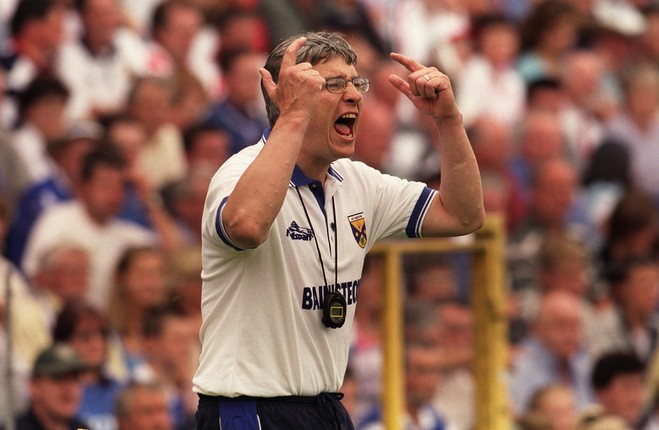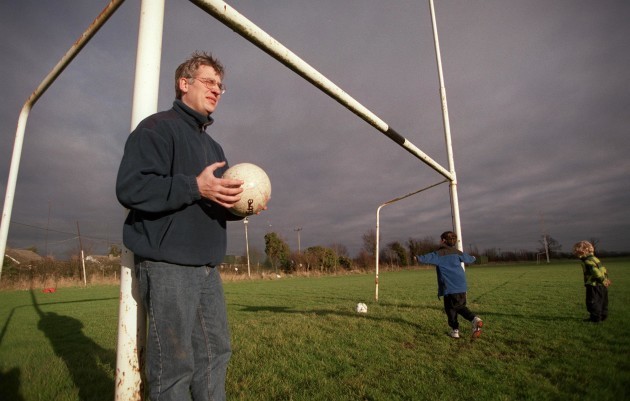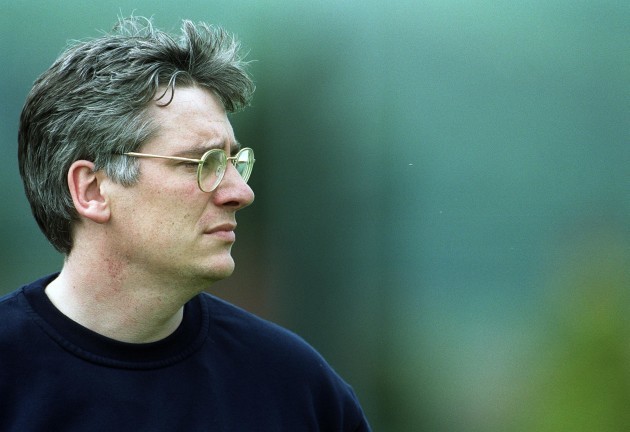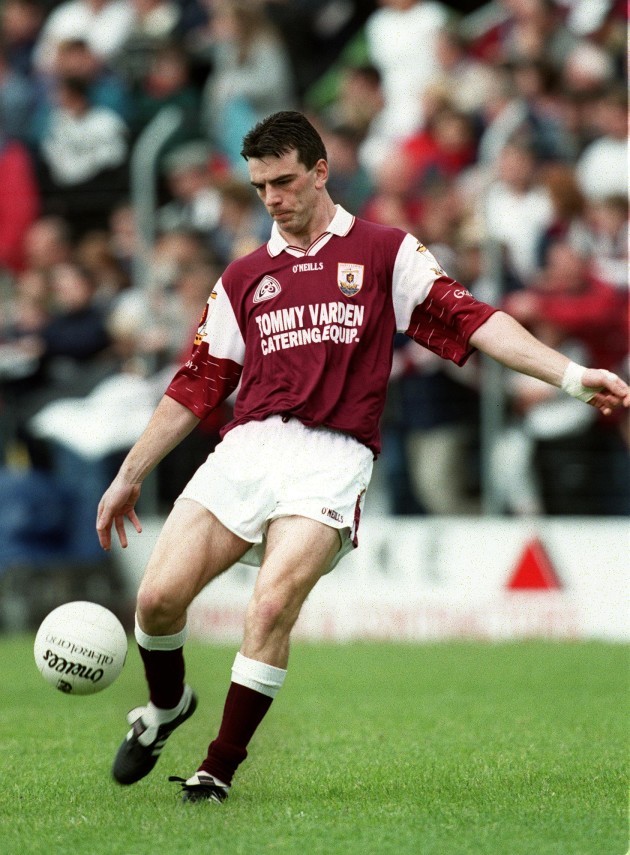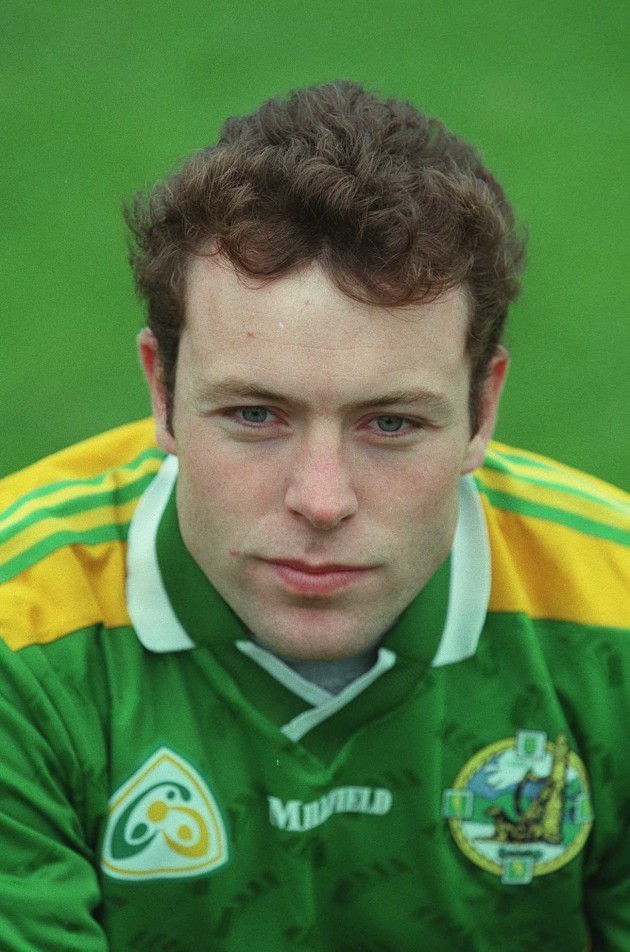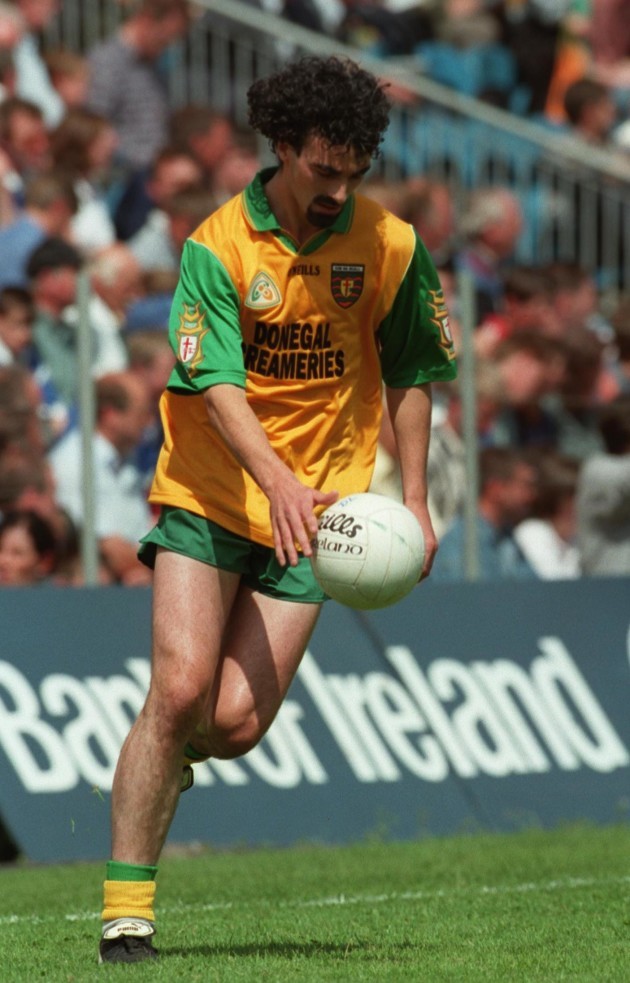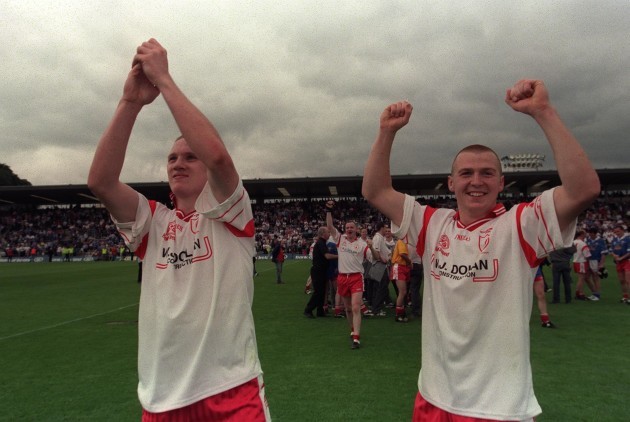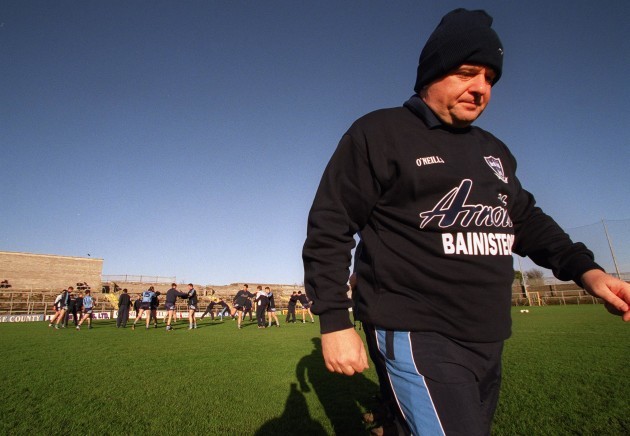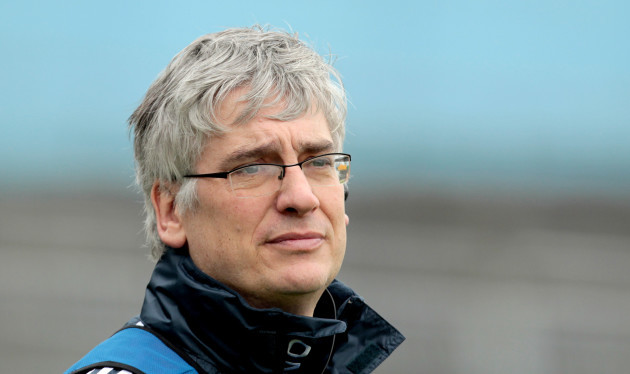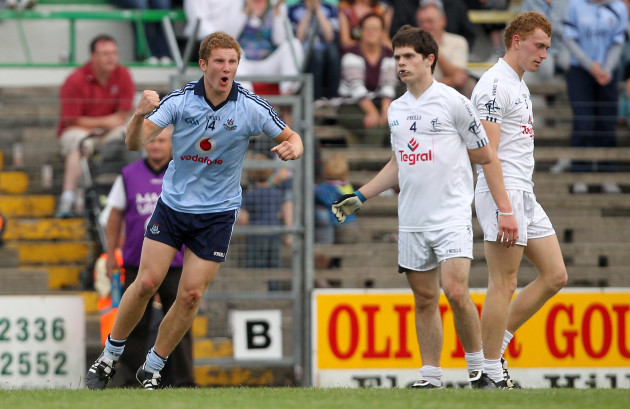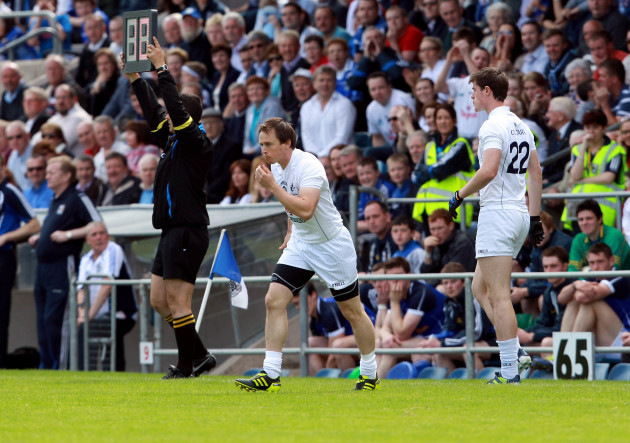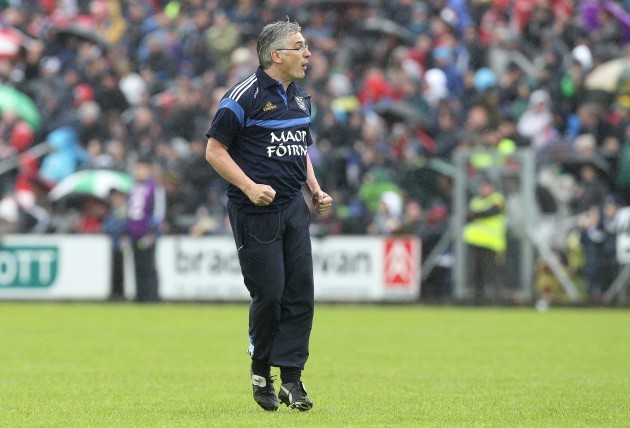WHEN HE PITCHED up in Tralee IT in September 1993, Val Andrews could hardly have predicted the voyage he was about to embark on.
It was the beginning of a career in Gaelic football management that would span three decades, from the highs of leading Tralee IT’s galacticos to back-to-back Sigerson Cup titles to the lows of the Seanie Johnston transfer saga during his second stint in Cavan and a failed bid to manage his native Dublin.
There was the county job he got by accident, the season with Dublin minors he describes as “his greatest coaching journey”, the player revolt that saw him removed as manager and his run-in with The Sunday Game pundits.
He was ahead of his time, introducing concepts like periodisation and weight training that were alien to the vast majority of GAA teams in the 1990s.
He’s a straight shooter who drove off the weak and moulded the survivors, making the game of football an equivalency test for life. He’s always prided himself as much in shaping men as he did lifting trophies.
“Success in coaching, you can measure it in cups and medals, I measure it on whether a fella crosses the road to you,” he tells The42. “And whether they stand and talk to you 10 years later and have fond things to say about it.
“That’s roughly what you see in all the coaching looking back. It’s the people and the journey, not the medals. The medals are just the receipts for the memories, but if you don’t have a medal at least you’ve all had a good journey.”
And boy, does he have memories.
Near the end of a two-hour phone conversation, Andrews pauses for a moment to reflect on his career.
“I don’t really regret anything. As a lad lying on his deathbed was asked, ‘Have you any regrets?’
“And he said, ‘I don’t regret anything I did, I just regret the things I didn’t do.’”
**********
Val Andrews tried his hand at various roles before he eventually found his calling in coaching.
A native of Ballymun, he studied a science degree in UCD in the 1970s. ”Now it took me years because I was fucking wild and too fond of drinking,” he admits.
He briefly worked delivering briquettes with the father of Dublin footballer Fran Ryder before spending eight years as a civil servant. He did a night course in business in DCU in ’85 and then moved to the private sector until he discovered “they were just civil servants with better suits.”
“I just knew I wasn’t kitted out to sit out in an office,” he says. “And I’m still not.”
A Masters in finance followed and then he took on a job in a factory that manufactured data products.
With the Irish economy still coming out of a recession, he was made redundant from that in the early 1990s. A lifeline arrived in the form of a job offer as a lecturer in Tralee IT (then known as Tralee RTC).
“I was unemployed so trying to get the train fare to go down to Kerry just to do the interview was hard,” he recalls. “I had two kids at the time. Two kids and two mortgages so things were good alright. Good laugh.”
In ’93, Tralee IT was essentially an agricultural training college. Denis ‘Ogie’ Moran was one of the high profile names on the interview board for the lecturing role.
At the time Andrews had some experience as chairman of Ballymun Kickhams and managing various underage teams, including a minor side that featured Paddy Christie, and U21 county title-winning sides of ’90/91.
“Them lads were really committed. We trained in the mornings at 7am in Ballymun. We made a bit of a name for ourselves, got complains from teachers for players being late for class. So I suppose I always had that madness in me. I arrived down in Tralee on my own, no family or anything, so you’d be looking for things to do.”
He volunteered to take charge of Tralee’s football team to fill his evenings while he was away from his family.
“I didn’t think I’d get into the GAA scene because I had this vision of Kerry, they ran this completely different operation and I’m coming from Ballymun. Although we had great county players, I thought a fella who won an All-Ireland medal was nearly God-like. You’d be afraid to talk to him. At that stage there were fellas with six or seven All-Irelands walking around the place.”
But the beginning of life in Kerry was tinged with sadness.
“I was only there two weeks when my first cousin was killed in a car crash, unfortunately. He was killed the day before the Cork vs Derry All-Ireland in ’93, I’ll always remember it.”
Tralee were far from a footballing powerhouse when he arrived. One of the early days involved trying to scrape together 15 players to fill a team for a game in Inchicore. They famously donned sky blue jerseys that many people presumed came from his Dublin roots.
“They thought it was a ‘Val culture’ thing,” he recalls.
But the truth is the college had no set of jerseys from the previous year. A new set in the Kerry colours with a stripe would have cost them £700, which they couldn’t afford. There were two sets of plain jerseys available to buy at a lower cost from the manufacturers – red like Cork or blue like Dublin.
“I can’t get the Cork jerseys because the Kerry fellas won’t play in them,” Tralee’s development officer John Kellegher told him. So they went with sky blue.
“It never became an issue until we were successful,” says Andrews. “There wasn’t too many people seeing sky blue jerseys when we were playing in Templemore in the pissing rain.”
In his second season, they achieved promotion to the top flight by winning the Trench Cup. UCC won the Sigerson Cup final the same day and Andrews immediately became concerned with the challenge that lay ahead.
“I remember watching UCC with Seamus Moynihan, Johnny Crowley and Johnny Buckley playing, I was looking at the standard. And I said to myself sitting in Pairc Ui Rinn, ‘Fuck me, we’d never get to that level would we?’”
Then another thought crossed his mind.
Where can I get a player or two?
The Tralee team was mainly filled with local club and U21 county players at that point.
A new health and leisure course was established in the college around the same time which helped them attract a legion of star names on scholarships. The general manager of a local Co-Op, Bill Kennedy, believed in the dream and put up four apartments to house some of Andrews’ footballers.
The big names followed.
Padraic Joyce, William Kirby, Mark O’Reilly, Mike Frank Russell, Jim McGuinness, Michael Donnellan and Barry O’Shea all came on board, many of them on full scholarships.
“First of all, they were all legal,” Andrews points out. “I’m a civil servant – I know rules. Some of them had no fucking interest in the courses, I’ll be straight with you. But sure that’s no different to other students.”
A former national sprint champion by the name of Pat Flanagan joined the college’s staff in ’96 and Andrews quickly roped him into the football set-up. It was a game-changer for the programme.
Flanagan, who was the strength and conditioning coach when Kerry won three All-Irelands under Jack O’Connor in the noughties, had no great experience in GAA back then but he knew how to train athletes.
Andrews picked his brain and they became great friends.
“We were doing things that counties weren’t doing and didn’t do for a few years,” says Andrews.
They had intricate pre-game warm-ups with footballs flying everywhere. They’d go away on weekend camps, training on a Friday night, three times on a Saturday and once on Sunday morning. The Saturday sessions would focus separately on skills, speed and endurance, and then weights.
“Because we were using different energy systems,” explains Andrews. ”That was unheard of then.”
In ’96 their season was ended by eventual Sigerson champions UCD, who boasted Larry Finnerty, John Divilly, Trevor Giles and Mick O’Dowd in their ranks.
“I knew we were onto something,” says Andrews. “At that stage of my managerial thing on a personal level, I was sort of obsessed. Demented, like. Angry maybe with life as well. Just completely focused, I was in my 30s so I was still young enough.”
The catalyst for the run of success was the arrival of Seamus Moynihan. After the ’96 Munster final, Andrews offered him the opportunity to study a Masters in Tralee.
“In some respects, it was the complete turning of my football career and Tralee’s career. It was the key event. He was just an incredible footballer.
“In terms of the scholarship and the Masters, it didn’t turn out great in the end and it’s one of my regrets. He didn’t really get well treated by the college after I left. And he didn’t get a job out of it and it definitely is a regret.”
While many of his players went on to become household names in the game, they were still in the nascent stages of their inter-county careers when the first Sigerson title arrived after beating the University of Limerick in ’97.
“Don’t forget, Joyce had played minor (with Galway) but none of them were stars at that stage,” Andrews says.
“Everyone thinks Galway won the All-Ireland, Val went up put them in a car and brought them down. They were there already. Joyce was funny. Great footballer and focused. He had a hard culchie edge to him in terms of winning. But he didn’t come to national fame until 1998.
“We’re talking ’96 at this stage. And even William Kirby or Barry O’Shea, in ’96 they weren’t there. They came in ’97. So Seamus Moynihan coming on board for ’97 was key, and John Casey from Mayo.
“He was in Letterkenny, he was like a lot of good footballers – they weren’t focused on their college, really. In hindsight, I think county footballers suffer in their careers ultimately because they’ve given so much to the game. And I don’t think we appreciate that.
“McGuinness was wired to the moon,” he says of the former Donegal boss. “Jimmy has done an awful lot of rebirth or regeneration and worked on himself. I can understand why. He came down in ’98 so he had lost a brother previous to that. So with personal tragedy like that going on….
“He hadn’t even done his Leaving Cert. He didn’t handle it well, he went wild I suppose for a while. He was on the Donegal team that won (the All-Ireland) in ’92. I remember him looking for a scholarship, he didn’t get one.
“He was still a very nice fella, don’t get me wrong. He’d be wild when he’d be going out and that but he was still a great trainer and dedicated.”
Tralee retained their crown the following year with a two point win over Jordanstown and then Andrews packed it in “for personal commitments.”
**********
So the following January, Andrews was sitting in his living room in Tralee with Flanagan. It came up in conversation that the Cavan senior job had become available.
Flanagan teased Andrews that he was scared of managing at county level.
“And I was afraid,” admits the Dublin man, “but don’t forget I didn’t play senior football. I thought these fellas that played inter-county were a different animal. I thought they were unbelievable. Manage a county? I had huge doubt.”
Flanagan said he’d help him. A Kerry-based journalist did them a favour by filing a piece for the Irish Examiner, linking Andrews with the job. He was one of 14 nominated and they went up to Cavan to gain experience of the interview process.
Unbeknownst to Andrews, no-one wanted the position because of the controversial ousting by the players of the previous manager, former Down star Liam Austin.
“This was all news to me,” laughs Andrews. “It was a whirlwind. It all happened in a week, from Saturday to Saturday.”
They put together a detailed training plan and travelled up to meet county board officials in the Kilmore Hotel in Cavan on the Friday night.
“The interview consisted of, ‘How are you going to do it and when can you start?’ We copped on then, these are offering us the job. We now have a job and we’re based 200 miles away from it.
“Flanagan looks at me across the room and says, ‘What have we fucking done here, man?’
“My brother who died God rest him and the lads in Ballymun never forgave me.
“Because I was sitting in the Kilmore right,” he says shaking with laughter, “8/1 in the bookies (to get the Cavan job) and I had the job in my pocket. And it never dawned on me (to tell them).
“The Cavan journey started then.”
It was a memorable tenure for Andrews in the Breffni County. They gained promotion to Division 1 of the National Football League, lifted the McKenna Cup and reached the Ulster final in ’01.
They narrowly lost that provincial decider to a coming Tyrone team that included future legends Stephen O’Neill, Cormac McAnallen, Peter Canavan, Kevin Hughes, Brian Dooher and Enda Gormley.
“2001 was great. Ulster final. The bus journey through Clones and the support Cavan got that day. The wall of sound. And the blue! I couldn’t believe it. And the only goal ever scored by Cormac McAnallen was in that game.
“We had got slated by Joe Brolly and all the (Sunday Game) boys after the semi-final. Myself and Art McRory did a press conference and I had a cut at the boys sneering at Cavan. I said, ‘I’ve no bother if you’re calling them no good but at least make it fact-based. They don’t deserve that.’
“The turning point of that game was on 63 or 64 minutes, not that you’d remember!” he laughs.
“We got a 21 yard free and their goalkeeper Finbarr McConnell was six or seven yards off his line. Jason O’Reilly decided to chip him. It was a one-point game for them.
“Jason went for the goal and it wasn’t by his standards that difficult a shot. It wasn’t and he missed it. Then they scored another point and eased out by two. Do I blame Jason? No, Jason’s a great bloke. He was right to go for it.
“He kept us to Division 1 sheerly through his goals. Great lad, I’ve absolutely great time for him and all the Cavan fellas in fairness.”
Andrews departed that autumn, despite being ratified to remain as manager for a fourth season. At a county board meeting, club delegates took a vote on his position. The lecturer prevailed by 40 to 24 votes but decided to step away anyway.
“I’d gotten them to Division 1, got them close to winning an Ulster final and they’d taken an hour to talk shite and have a vote,” he recalls. “And I said, ‘You know what you can do now lads, get somebody else to do it.’
“That would be me, I’d get thick quickly. I don’t know, it was a bit immature I suppose as well but that’s the way I am.”
He announced his resignation on 11 September 2001.
“We were on the 1 o’clock news and that was the last it was heard of because the Twin Towers went down that day.
“I got one phone call from a journalist but I didn’t want to talk about it. How could you talk about Mickey Mouse stuff, that I got thick and resigned in Cavan, when two or three thousand people are after being killed? You have to put things in perspective. A bit like now.
“The only reason I regret it was that I just walked out, I forgot about the people around me. I forgot about (selectors) Terry Hyland and Seamus Kiernan. I had taken their jobs by just thinking about myself.”
The Dublin job became available after Tommy Carr’s reign ended in October. By that stage, Andrews had moved back to Dublin after securing a lecturing position in sports management and coaching at Blanchardstown IT.
With three years of inter-county experience behind him, Andrews put his name forward for the top job in the capital.
It was the closest he ever came to managing his native county at senior level. Dublin, who were All-Ireland champions six years earlier, eventually appointed Tommy Lyons from the four-man shortlist which featured ‘Pillar’ Caffrey, Alan Larkin and Andrews.
“I went for the Dublin job yet Tommy Lyons got it. I don’t know if I went close, you’d have to ask them.
“I don’t know if I’d have been a fit for Dublin. County boards are wary about fellas who just say, ‘Here, keep your job.’ I’m not a ‘Yes Man’ and I’m not going to play PC games. Accountability, honesty, fairness and equity.
“I don’t know. At that time I really, really wanted to do the Dublin job. But look, it wasn’t to be. Went for that job, Tommy Lyons got it. Pillar went for the job at the same time. I probably could have went in to help Tommy, maybe, I don’t know.”
His next big job in management was with the Louth footballers, which was “good craic now I tell you.”
He continues: “They like football don’t get me wrong, but they had no culture of training at that stage.
“The reason Dublin, Kerry and all them are so successful, these lads like James McCarthy train six days a week for 10 years. They don’t be taking winters off.
“You have a numbers game too with Dublin, I’m not going to get away from that. When you see what the lads do to win, there is nothing else. Successful counties are well looked after but they fucking sacrifice a tremendous amount.”
And the journey continued.
He took on the Leinster Railway Cup team for five years, guiding them to glory in ’04 and ’05. Andrews got involved with Dublin development squads in ’06 and four years later, when that crew reached minor level, he rates it as his most memorable season in management.
That Dublin minor crop included 17-year-olds Ciaran Kilkenny and Jack McCaffrey.
They came up against a very strong Kildare side in the Leinster quarter-finals, packed with future senior stars like Paul Cribbin, Kevin Feely Fergal Conway, Tommy Moolick, Niall Kelly and Sean Hurley.
Dublin came through the backdoor after losing the first round to the Lilywhites and then a three-game epic transpired between the neighbours in the last eight. The sides were inseparable after extra-time in Newbridge and then Parnell Park, before Kildare eventually prevailed by three points in Navan.
“That was the greatest coaching journey I’ve ever been on, we tried lots and lots of different things.
“We had black t-shirts printed with Japenese symbols on them, which stood for constant improvement, ‘Kaizen’ – excellence and hard work.
“We gave them grinds. We brought them to All Hallows religious place. Some of the best things were masses given by Monseigneur Eoin Thynne, he’s a Ballymun fella and played with my brother. He was the chaplain to the army.
“I think it’s important to have a belief system. So he’d come in and do a mass on scripture but he was fabulous because he’s just a great human being. I wanted the kids to see that it’s okay to cry, it’s okay to have a belief – and it’s okay not to.
“They would probably have never met a fella who was a priest as well as a human. One of the lads, Niall McGovern he plays with Na Fianna, he was on that minor team. He rang me up last year and we met for lunch.
“He said, ‘My ma still talks about that mass.’ And I’d forgotten about it, that we’d organised an evening mass in All Hallows for themselves and their parents after training. It was a celebration.”
**********
The following year, Andrews returned for his second stint over Cavan “on the rebound” from the crushing blow of losing with the Dublin minors. It was nowhere near as successful as his first tenure a decade earlier.
Not one to shirk away from the truth, he describes it as “a managerial failure but great learning experience.”
What did he learn?
“Never go back,” he quips.
“It was an emotional rebound. I felt it was an unpaid debt as well. Not to Cavan, but to Terry (Hyland). Because at the end of the day, Terry was a good friend. He wanted to do the senior job, had good success with the U21s and had a good strategy.
“He was a very good strategist and would have thought in terms of long-term like myself. Great businessman, great fella. He wanted the job but he said to me, ‘Val, I don’t think they’ll give me the job. Will you come with me?’
“I said, ‘No bother.’ That would have been a big part of the decision.”
Andrews was at the helm for the infamous saga that saw Seanie Johnston dropped from the squad, before a messy transfer process led to him joining Kieran McGeeney’s Kildare.
“Seanie Johnston has many fine qualities but he was going through the motions, not really focused,” says Andrews.
“And I don’t think you should allow people do that. My belief system is you shouldn’t be going through the motions and everybody should be a team player. So I got rid of seven of them, there were six others. It was a culture decision.
“I’m not blaming the individuals. As we see now, life and time are precious. I’ve never really talked to him since.
“To be honest, I like the lad. He’s like us all, we all have flaws going on, myself included. In hindsight – and hindsight is such a great man – I really felt sorry for him when he went to Kildare. I was thinking, ‘Seanie, who’s advising you?’ I was thinking of going up and talking to him (to tell him), ‘Don’t.’
“So yeah, that year was a disaster. I knew once I got rid of Seanie Johnston and the other six, I was fucked.
“But you have to do the next right thing according to your value system. And I also knew, just like I did in Louth when I got rid of a good few of them as well, that the county would be in a better place when you’re finished.
I was in poor enough form. I would say I was a little bit depressed in Cavan at that point on a personal level so it wasn’t a place for me. I resigned after the league. The team weren’t playing for me, they weren’t listening.
“It had nothing to do with the lads really but I was getting to a stage where I didn’t like football and you should never be like that.”
His relations with the squad soured and he encouraged the players to hold a meeting after the 2012 league, half-knowing they’d press for a change of manager.
“Terry is a wise man and he said to me, ‘You know what’s going to happen.’
“I said, ‘I know Terry but I don’t want to be in a dressing room that doesn’t want me.’
I try to be honest and I try look at myself. I wasn’t getting anything back from them and perhaps I wasn’t functioning at the proper level because of other things that were going on in my life.
“Fellas are very selfish in terms of winning at that age. I’m sure if I look back at myself, I was like that. If you have a team meeting, they’re always going to get rid of you.
“Was it the right decision? It was the right time to go and it served well in that Terry took over. I knew he was going to take over. It was the ideal time to do it. If I went at the end of the season they’d have a big kerfuffle.”
And that was the end of Andrews as an inter-county manager, but he’s remained embedded in the game since. He led IT Blanchardstown to Trench Cup glory in 2017, worked as a video analyst with Cork footballers and several club teams.
In 2018, Andrews took charge of the Dublin’s Masters (over 40s) team. Featuring some former Sky Blue stalwarts like Ray Cosgrove, Shane Ryan and Peadar Andrews, they defeated Tyrone that September to get their hands on the All-Ireland title.
What’s next for Val Andrews?
One thing is for sure. He doesn’t plan on stopping anytime soon.
The42 is on Instagram! Tap the button below on your phone to follow us!
